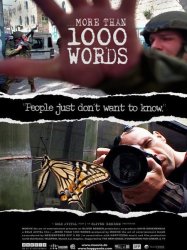A Plate of Sardines is a french film of genre Documentary directed by Omar Amiralay with Mohamed Malas
A Plate of Sardines (1997)

If you like this film, let us know!
Length 17minutes
Directed by Omar Amiralay
OriginFrance
Genres Documentary
Themes Films set in Africa, Films about religion, Documentary films about war, Documentary films about historical events, Documentary films about religion, Political films, Films about Jews and Judaism
Rating70%










A Plate of Sardines (Arabic: طبق السردين) is a Syrian documentary film by the director Omar Amiralay. This short documentary tells Amiralay's own story about how he first heard of Israel. In his own words, "The first time I heard of Israel, it was in Beirut, talking about a sardine dish. I was 6 years old, Israel was 2." The film records Amiralay's filmmaker friend Mohamed Malas own reflections on his own native city of Quneitra before and after the Israeli-occupation and later liberation of the city. All the while strolling around the ruins of what's left of Quneitra.
^ http://www.cinereel.org/article401.html
Synopsis
Un homme se souvient du conflit au Moyen-Orient à travers sa mémoire personnelle. Dans ce court documentaire, Amiralay se penche sur la première fois qu'il a entendu parler d'Israël. A travers des conversations enregistrées avec le cinéaste Mohamed Malas, Amiralay et Malas partagent leurs propres histoires et expériences sur Israël et l'occupation israélienne.Actors

Mohamed Malas
(Himself)
Comments
Leave comment :
Suggestions of similar film to A Plate of Sardines
There are 0 films with the same actors, 5 films with the same director, 8961 with the same cinematographic genres, 11302 films with the same themes (including 70 films with the same 7 themes than A Plate of Sardines), to have finally 70 suggestions of similar films.If you liked A Plate of Sardines, you will probably like those similar films :
 , 49minutes
, 49minutesDirected by Omar Amiralay
Genres Documentary
Themes Films set in Africa, Films about writers, Films about religion, Documentary films about war, Documentary films about historical events, Documentaire sur une personnalité, Documentary films about religion, Political films, Films about Jews and Judaism

Directed by Omar Amiralay
Genres Documentary
Themes Films about religion, Films about terrorism, Documentary films about law, Documentary films about war, Documentary films about historical events, Documentary films about politics, Documentary films about religion, Documentary films about terrorism, Political films, Films about Islam

Nights of the Jackal (1988)
, 55minutesDirected by Abdellatif Abdelhamid, Omar Amiralay
Origin France
Genres Drama, Documentary
Themes Documentaire sur une personnalité, Documentary films about politics, Political films
Rating71%






A Flood in Baath Country (2003)
, 48minutesDirected by Omar Amiralay
Origin France
Genres Documentary
Themes Documentary films about politics, Political films
Rating73%





 , 1h25
, 1h25Directed by Yolande Zauberman
Origin France
Genres Documentary
Themes Films set in Africa, Films about religion, Films about sexuality, Documentary films about law, Documentary films about war, Documentary films about historical events, Documentaire sur une personnalité, Documentary films about politics, Documentary films about religion, Political films, Films about Jews and Judaism
Actors Juliano Mer-Khamis
Rating58%





Dans les bars de Tel Aviv, la nuit, la réalisatrice demande à des jeunes Juifs s'ils auraient des relations sexuelles avec des Arabes, et à des jeunes Arabes s'ils feraient l'amour avec des Juifs. Chacun donne son avis, avec plus ou moins d'explications, sur le symbole que cela peut représenter pour eux (beaucoup l'ont déjà fait) ou au contraire leur refus. Des jeunes issus de familles mixtes (un parent juif, l'autre arabe) sont également interviewés. Le film recueille aussi les témoignages du journaliste Gideon Levy et de l'acteur Juliano Mer-Khamis, de mère juive et de père arabe, assassiné en 2011 par des Palestiniens à Jénine.

The Gatekeepers (2012)
, 1h35Origin France
Genres War, Documentary, Action, Historical
Themes Films set in Africa, Spy films, Films about religion, Films about terrorism, Documentary films about law, Documentary films about war, Documentary films about historical events, Documentaire sur une personnalité, Documentary films about politics, Documentary films about religion, Documentary films about terrorism, Political films, Films about Jews and Judaism
Rating75%





Dror Moreh a décidé de réaliser ce film après avoir mesuré l'importance décisive du Shabak (Shin Beth) sur la scène politique israélienne depuis quarante ans. Ces six directeurs à la retraite de la sécurité israélienne évoquent leurs victoires et les échecs passés sans nostalgie. Très critiques vis-à-vis des politiques menées par leurs gouvernements (à l'exception de celui d'Yitzhak Rabin), ils défendent tous un changement radical de politique en Israël : la recherche de la paix et la reconnaissance au plus tôt de l’État palestinien.

Iron Wall (2007)
, 52minutesGenres Documentary
Themes Films set in Africa, Films about religion, Documentary films about law, Documentary films about war, Documentary films about historical events, Documentary films about politics, Documentary films about religion, Political films, Films about Jews and Judaism

The Making of a Martyr (2006)
Origin Canada
Genres Documentary
Themes Films set in Africa, Films about religion, Films about terrorism, Documentary films about law, Documentary films about war, Documentary films about historical events, Documentaire sur une personnalité, Documentary films about politics, Documentary films about religion, Documentary films about terrorism, Political films, Films about Jews and Judaism, Films about Islam
Rating69%






...More Than 1000 Words (2006)
, 1h18Origin Israel
Genres Documentary
Themes Films set in Africa, Films about religion, Documentary films about the visual arts, Documentary films about law, Documentary films about war, Documentary films about historical events, Documentaire sur une personnalité, Documentary films about politics, Documentary films about religion, Political films, Films about Jews and Judaism
Actors Galit Gutmann
Rating74%





 , 1h30
, 1h30Origin USA
Genres Documentary
Themes Films set in Africa, Politique, Films about religion, Documentary films about law, Documentary films about war, Documentary films about historical events, Documentaire sur une personnalité, Documentary films about politics, Documentary films about religion, Political films, Films about Jews and Judaism
Rating80%





 Connection
Connection